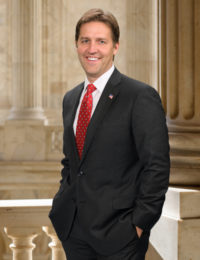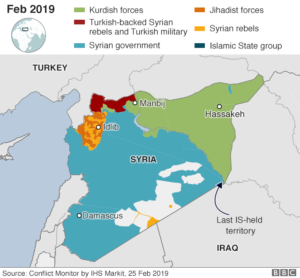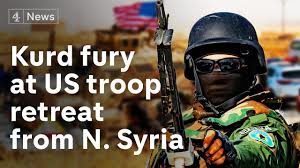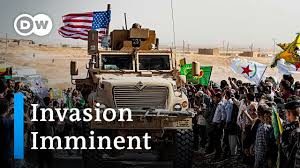The United States has begun withdrawing troops from northern Syria in advance of an expected Turkish military offensive against Kurdish forces in the area, the Washington Post reports.
The move came after a phone call between U.S. President Donald J. Trump and Turkish President Recep Tayyip Erdogan. U.S.-allied fighters, known as the Syrian Democratic Forces, warned that a Turkish incursion would threaten progress against the Islamic State, the New York Times adds (HT:CFR).
Defying the advice of top defense officials, the decision paves the way for a bloody assault on the Kurdish minority population there and a possible resurgence of the Islamic State, Foreign Policy’s Lara Seligman writes. U.S. defense officials had sought to maintain a small American presence in the region to continue operations against the Islamic State terrorist group and safeguard the U.S.-backed Syrian Democratic Forces (SDF) against repeated threats of a Turkish invasion.
 “If the President sticks with this retreat, he needs to know that this bad decision will likely result in the slaughter of allies who fought with us, including women and children,” said U.S. Senator Ben Sasse (right), a member of the Senate Intelligence Committee and of the National Endowment for Democracy’s board. “I hope the President will listen to his generals and reconsider. And before Turkey butchers innocent Kurds, Erdogan should carefully consider his privileged status as a NATO member. The American people don’t partner with genocidal regimes.”
“If the President sticks with this retreat, he needs to know that this bad decision will likely result in the slaughter of allies who fought with us, including women and children,” said U.S. Senator Ben Sasse (right), a member of the Senate Intelligence Committee and of the National Endowment for Democracy’s board. “I hope the President will listen to his generals and reconsider. And before Turkey butchers innocent Kurds, Erdogan should carefully consider his privileged status as a NATO member. The American people don’t partner with genocidal regimes.”
Brett McGurk, who served as Trump’s envoy for the fight against the Islamic State, said the White House is essentially handing northern Syria over to Turkey — a decision many feel could lead to Turkey slaughtering the United States’ Kurdish allies in the region, the Post adds.
The true dynamic at play here is a Turkish drive to strengthen its hand (1) militarily versus Russia, Hayat Tahrir al-Sham and al-Qaeda loyalists in Idlib and (2) diplomatically versus the U.S. and the Syrian Democratic Forces in Syria’s northeast, said the Middle East Institute’s Charles Lister.
American intelligence officials say the Al Hol camp, managed by Syrian Kurdish allies with little aid or security, is evolving into a hotbed of ISIS ideology. the New York Times reports:
The American-backed Syrian Kurdish force also holds more than 10,000 ISIS fighters, including 2,000 foreigners, in separate makeshift prisons. The custody of all these people could be in jeopardy, American officials said Sunday night, depending on whether any Turkish incursion sets off a much larger conflict in northeast Syria.
Senator Lindsey Graham (R., S.C.) also lambasted the decision, National Review adds.
“This impulsive decision by the president has undone all the gains we’ve made, thrown the region into further chaos, Iran is licking their chops, and if I’m an ISIS fighter, I’ve got a second lease on life,” Graham said. “To those who think ISIS has been defeated, you will soon see, and to Turkey you have destroyed the relationship, what little you had with the U.S. Congress, and I will do everything I can to sanction Turkey’s military and their economy if they step one foot into Syria.”

BBC
“I don’t know all the details.” But, he added, “If press reports are accurate this is a disaster in the making.”
Sen. Chris Murphy (D-Conn.), who voted against authorizing the use of force in Syria in 2013, upbraided the president, tweeting that “a total lack of foreign policy imagination created this crisis,” POLITICO adds.
“Could have flooded northern Syria w political/diplomatic resources to find a governance structure that both Kurds/Turks could accept,” he wrote online. “Instead, Washington spent the last 2 years squabbling over 2000 or 500 troops in Syria, when the number of troops had almost no bearing on the future of northern Syria.”
The decision threatens to undermine gains made by women and other sectors of civil society, observers suggest.
On the ground in Syria, you can see that progress is not about “foreign influence”; instead, it’s about seeing combat-veteran women who led the fight against ISIS translate those gains into expanding roles for women across politics and civil society across the region and among all ethnic groups, notes one analyst.

YouTube
Sara Kayyali, a Syria researcher for Human Rights Watch, warned that there was no guarantee that civilians would be protected in a so-called safe zone and that in the past Syria had seen violations of human rights within such buffer zones, NBC News adds.
“The track record for safe zones in Syria has been anything but,” she said. “We’ve documented civilians being bombed or forcibly displaced in these areas even after they were announced to be safe zones.”
The efforts to normalize with the Syrian regime and the calls to reinstate it in the Arab League are to a large extent also the result of pressure from Russia, which argues that such a move will advance peace in the country, the Middle East Media Research Institute adds (HT:FDD) adds. On the other hand, the U.S. is working to stop rapprochement with Assad as long as he does not commit to a political process in his country. […]The surprising sight of the Arab League secretary-general greeting and embracing the Syrian officials sparked speculation in the Arab media about whether it heralded Syria’s reinstatement in the Arab League.
 The final report of the Congressionally-mandated Syria Study Group provided a superb assessment of the state of play in Syria and why the crises in Syria matter to U.S. national security interests, said MEI analyst Lister:
The final report of the Congressionally-mandated Syria Study Group provided a superb assessment of the state of play in Syria and why the crises in Syria matter to U.S. national security interests, said MEI analyst Lister:
However, while the report appears to conclude that current policy is insufficient to sustain any meaningful U.S. influence over the trajectory of events in Syria, it nonetheless recommends little in the way of new, or enhanced policy. Kicking the can down the road for the sake of assuaging the gut concerns of President Trump guarantees an eventual U.S. withdrawal from Syria, the consequences of which will be detrimental to U.S. interests – both in the short and long-term.
The regime’s victory in southern Syria in mid-2018 and its implementation of “reconciliation” deals was meant to exemplify the regime’s path to victory. However, terms of reconciliation have not been met and the regime lacks the economic, political or security capacity to stabilize, Lister adds.







